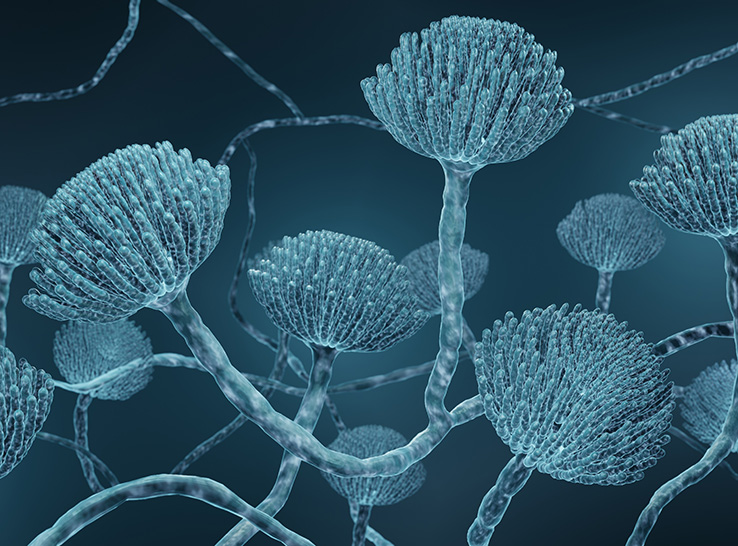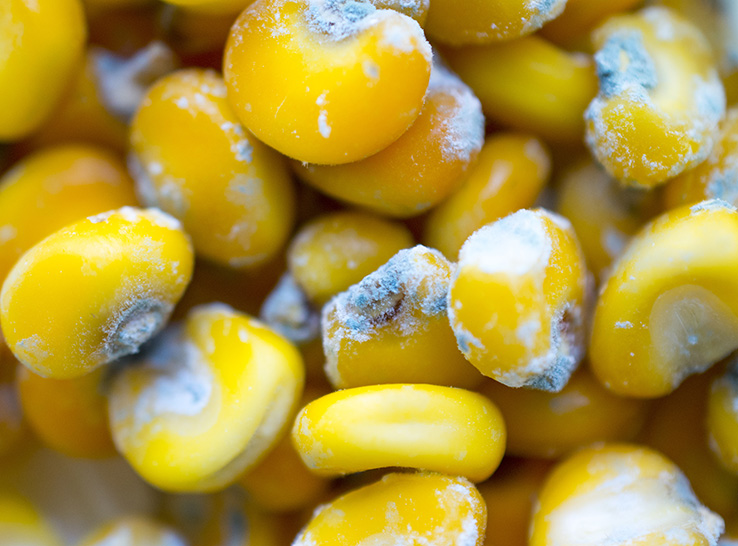Mycotoxin-contaminated feed and heat stress can affect the performance and nutrient use of broiler chicks, but the combined effects of the two factors are less clear, according to research by Molly Lobel, PhD, and her research team at the University of Kentucky.
Mycotoxins, including aflatoxin and zearalenone, are toxins produced from molds, which are associated with crops such as corn. They are particularly prevalent in corn fines, nutrient-dense products of the crop’s drying process. A 2022 report found that 75% of 330,000 corn samples had mycotoxin levels above the detection limit.1
Lobel presented her findings at the 2024 Poultry Science Association meeting.
Study design
The team compared feeding regular corn and mycotoxin-contaminated corn fines to birds in a replicated cage experiment while exposing groups of birds to heat stress for 6 hours a day.
The 21-day study included 384 day-old broiler chicks in eight treatments using four diets containing 0%, 33%, 66% or 100% mycotoxin-contaminated corn fines. The researchers exposed the birds to two heat-stress levels: the regular temperature of 84.9° F (29.4° C) and 6 hours of 93.7° F (34.3° C) from days 7 to 21.
They collected several types of data for analysis:
- Bodyweight on days 0, 9 and 21
- Liver samples collected from one bird per cage on day 21
- Excreta collected on days 20 and 21
- Contents of birds’ ileum on day 21
Clear production impacts
The researchers found that, as mycotoxin contamination increased in diets, bodyweight and feed intake decreased because the feed was less palatable to the birds. They also saw that energy retained by the birds from their feed dropped with both increasing mycotoxin contamination and heat stress.
Regarding nutrient retention, the research team observed that higher levels of mycotoxin contamination caused birds to retain fewer nutrients, whereas the opposite was true in the heat-stressed birds.
“The birds are now digesting and absorbing less because they’re eating less. So, it is easier for them to retain the few nutrients that they are eating rather than having that bigger diet and not being able to pull all the nutrients out of it,” Lobel explained.
Neurological and genetic effects
At the same time, calcium and phosphorus increased in digestibility and retention with mycotoxin levels, while other variables such as dry matter, nitrogen and energy decreased.
Lobel attributed the uptick in calcium to the specific mycotoxin deoxynivalenol, which can affect neurotransmitters that influence calcium waves throughout the bodies of animals.2 The same effect observed in phosphorus could be explained by the mycotoxins decreasing activity of the klotho gene and the SLC20A2 gene in the small intestine of birds, she suggested.
Together, diet and heat stress had a significant combined effect on calcium digestibility and phosphorus retention, but the team saw no other significant combined interactions.
Lobel plans to continue her work by looking deeper into the liver samples collected in the study, using RNA samples to highlight specific stress markers in the birds’ genes.
1 Cargill World Mycotoxin Report, Cargill. 2022.
2 Sauvé B, Chorfi Y, Montminy ML, Guay F. Vitamin D supplementation impacts calcium and phosphorus metabolism in piglets fed a diet contaminated with deoxynivalenol and challenged with lipopolysaccharides. Toxins. 2023;15(6):394.







